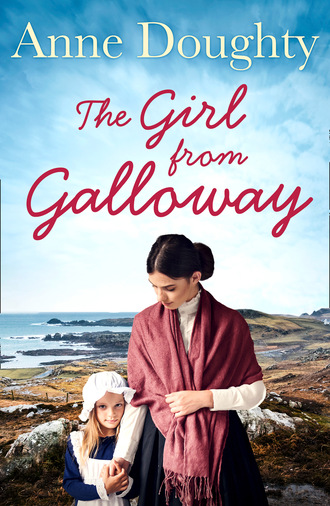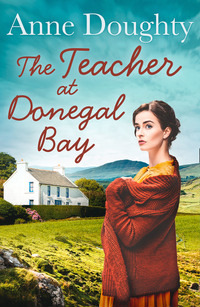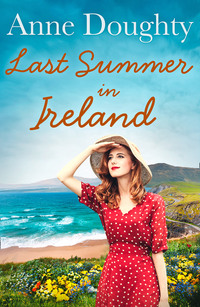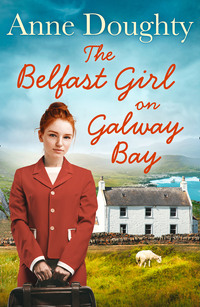
Полная версия
The Girl from Galloway
She laughed as she filled the kettle from the enamelled bucket and hung it over the fire, thinking as she did of the way in which people put together the clues to make a stranger less strange, exactly as they had both just done.
‘Yes, I suppose I still have my Scots accent when I speak English,’ she said, as the thought occurred to her. ‘I lived near Dundrennan, in Galloway, and my husband is there right now working for my father.’
‘And you are here on your own?’ he asked, surprised.
She shook her head. ‘No, I’m here because we have two children at school. They’re still too young to make that long journey, even setting aside the expense,’ she explained, as she brought mugs and a jug of milk to the table.
‘And there is a school? I’d not heard about that.’
‘That’s not entirely surprising,’ she replied, turning towards him as she took out the cake tin and cut him a generous slice. ‘It’s not a National School, not up here; it’s what the Irish call a hedge school. Do you know about them?’
‘No, I’ve never heard of a hedge school,’ he said slowly. ‘Surely they can’t be in hedges!’
‘Some were, apparently,’ she replied, ‘but, fairly, more were in abandoned houses, or sheep folds that had been given a sod roof, or a covering of layers of branches. Have you heard of the Penal Laws?’ she asked gently, as she heated the teapot.
‘Oh yes, I do know about those,’ he said. ‘They discriminated against Catholics in particular and everyone else in general, other than Anglicans, of course, so they couldn’t have churches, or chapels, or priests, or meeting houses. There’s a Mass rock in a field near where my cousins live, not far from Creeslough. I asked them if it was still in use and they said it was, but apparently, the law has either been removed or has simply faded away. Must have done, for there’s now a chapel nearby,’ he said, as she helped him to a slice of cake.
‘I don’t think they’ve been repealed,’ she replied dubiously, ‘but certainly there are chapels and priests, though some remote areas have no money for a building. That’s mainly why Mass rocks are still being used. But the reason I asked,’ she went on, ‘is because the Penal Laws also discriminated against Catholic education. They weren’t allowed to have schools even where there might have been the money to create one. So people had to improvise. They’re still doing it. Though I should say the “authorities” whoever they might be, do now just turn a blind eye. There’s a hedge school in the next townland run by a friend of mine and his niece in his own cottage,’ she said. ‘Or at least there is at this moment. They have financial problems and may have to close.’
She paused as she poured the tea and then turned towards him. ‘I’ll tell you anything I can that you want to know but if I’m defeated I’ll find reinforcements for you. I think perhaps you’ve come just at the right moment.’
*
The more they talked, the more sure she was that Jonathan Hancock was going to be able to help. However different his life might be, he seemed to have a capacity to understand very different situations, and he quickly revealed that he knew perfectly well how much, or how little, land was needed to feed a family if there was no other source of income.
‘Do you mind telling me how much land you have yourself?’ he asked politely.
‘No, of course not,’ she said. ‘I can see perfectly well why you need to know, but I do get confused with the Irish system of measurement, especially the roods and perches. At home, we had the five-acre field and the ten, or the twenty, so I can visualise those. But the small measures here are beyond me. But I do know that last year the landlord did transfer a piece of land from a cottage that became derelict when its elderly owner died. At least a rood, I was told. He put up the rent, of course, but it means we have an extra piece of potato garden. We can walk round it later if you like. My husband and the children planted the potatoes before he went to Scotland.’
Jonathan looked away and for some moments he didn’t speak. She saw such a look of sadness pass across his face that she forgot what she was going to say about their nearest neighbours and the struggle they had to feed their much larger families on the smaller patches of garden they had.
She waited patiently as he produced a pencil and notebook. He put it down on the edge of the table but did not begin to write.
‘I’ve read a good deal about Ireland from various travellers but I had no idea how difficult it might be,’ he began. ‘My relatives both in Creeslough and in Armagh are all landowners, and while they’re kind-hearted people and generous in their own way, some of them just don’t appreciate the situation many of their tenants are in,’ he began, his body tight with tension. ‘They can’t see that only radical change will remove the risk that all these people live with.’
‘If you mean political change, I’m afraid I’m not very well informed there,’ Hannah came back at him. ‘I’ve always felt that the lawmakers were too far away from the problems. I could never see how their deliberations could meet the situation if they’d never had experience of it for themselves.’
To her surprise, he laughed – a genuine, warm-hearted laugh.
‘You would be so welcome at our local Meeting,’ he said, enthusiastically. ‘There are some wise people there and they insist that the first thing you must do, if you want to help people, is to go and look at the situation and try to see it from their perspective. That’s what the Friends have tried to do; that’s why I’m here.’
‘So you’re a Friend, are you?’ she asked, beaming at him. She knew a little about the Quakers and their principles. ‘I thought you might be. I have some cousins in Scotland who go to Meetings in Dumfries. I do know a little about your beliefs though my own family were Covenanters, good-hearted and kind, in my father’s case, but usually very rigid and unbending.’
The talk moved on as they shared their very different lives and activities. It was quite some time before Jonathan paused and picked up his notebook.
‘I think you’ve just answered a question for me I didn’t know I needed to ask,’ he said with a smile. ‘Here I was, focused on information, like acreages, but what I really need to know is how the Central Committee could help improve matters. In this situation, in this place, at this time. What most needs doing right here? Now.’
‘I think I can help you there,’ she said, intrigued by the change in his mood, ‘but might I suggest that first you begin making whatever notes you need to make, while I go and find some eggs to make us a bite of lunch.’
*
Jonathan had protested politely that he couldn’t possibly impose upon her for lunch, but by that point in their conversation she was quite at ease with him. She remembered what she had once read about the Quaker view of life, their commitment to ‘plain speaking’ and to honesty in all their dealings. That had always seemed so appropriate to her.
Suddenly, as she searched in the outhouse for hidden eggs, she remembered her eldest sister explaining to her that Quakers would not swear oaths but only give their word. For a long time, she said, they had not been able to be Members of Parliament because of their unwillingness to swear. Her sister couldn’t remember who was responsible for solving that problem, but ‘affirmation’ came to be accepted as the equivalent of ‘swearing’. It was, of course, in keeping with the simple Quaker doctrine, that ‘My Yea is my Yea, and my Nay is my Nay’. The first Quaker Members of Parliament, mostly Scottish, were then able to take their seats.
Jonathan was scribbling vigorously as she came back into the cottage by the back door, three brown eggs in one hand and a covered dish of butter in the other.
‘I have to confess I was hungry,’ he said later, as he wiped his plate with a piece of bread, but I had not the slightest expectation of anyone giving me such a nice lunch, or indeed any lunch at all. Thank you so much. I do hope there is something I might be able to do in return.’
She laughed and pointed to his notebook. ‘I haven’t got anything written down, but I do have a list in my head,’ she said. ‘Could I share your practice of plain speaking and tell you what is on my list?’
‘I should be delighted,’ he said firmly. ‘I’ve only got two more days here and then I’m due to go to Armagh.’ His voice dropped markedly. ‘I’ll probably get back in the autumn, but you can always write to me, care of my home address if there’s something else I can do. My housekeeper will always know where I am. Now, tell me more.’
*
After lunch a heavy shower of sleet came sweeping down the valley. It cleared as quickly as it had come, but one look at the sky and Hannah knew she’d better warn her visitor that he stood to get thoroughly soaked if he didn’t get off the mountain before rain settled in for the rest of the day.
‘The children might just get home dry from school but with them I can at least change their clothes by the fire,’ she said, looking him up and down as he stood up, put his notebook in his pocket, and nodded.
‘I’d like to have met them, Hannah, but I might manage that another time. This area of Donegal and the area round the city of Armagh is my personal research territory because I have family connections there. I’ve been to both places often enough, but I haven’t yet any contacts for this work in Armagh. Do you know Armagh at all?’
‘No’, she said, sadly. ‘I came straight to Donegal on the Derry boat, so I’ve seen nothing of the rest of Ulster. I’d love to travel, but I haven’t even travelled in Scotland, just from Dundrennan to Gretna Green and then along the coast north and west to a little place called Cairnryan. One of my brothers, Matthew, married into a boat-building family nearby. He gave us a bed for the night and wished us joy on our marriage. It was very good of him for I hadn’t seen him for years. He’s the youngest of the brothers, but still much older than I am,’ she said, as she walked to the door with him and looked up again at the threatening sky.
‘I don’t know how to thank you,’ he said. ‘I’ve learnt more from you in one morning than I’ve learnt in most of my reading and all my efforts to study reports from the Central Committee. I shall write and tell you what I’ve been able to arrange. Please,’ he said solemnly, ‘will you keep me informed of anything you think I might be able to do. I do hope we’ll meet again.’ He held out his hand as a few large drops of melted sleet dripped from the thatch.
‘Good luck,’ she said. ‘I’ll do anything I possibly can to help.’
He raised a hand in salute and moved swiftly down the rocky track, which now glistened with moisture.
*
She moved around the kitchen, clearing the table, bringing out mugs for the children’s expected tea. What an extraordinary thing to happen. Even before she had worked out exactly what needed to be done to resolve the problems of the school and Daniel’s threatened income, help had appeared in the most unlikely guise.
He’d given her the name of an elderly Quaker who had been a solicitor and was still entirely capable of advising her what to say and what to write in order to see if there might be hope for restoring Daniel’s pension. He’d also assured her that reading books, pencils and paper could be provided quite quickly for the school and that she would receive at the same time a list of educational aids, like maps and copybooks, from a Quaker-run organisation in Dublin who would provide them free of charge.
As she refilled the kettle and took up her sewing, she wondered what Patrick and her father would say when they heard her news. Patrick would probably say: ‘Sure, haven’t you the lucky touch an’ always have had,’ while her father would laugh and say: ‘Sure, didn’t you always get what you wanted but never let it spoil you.’ As for Daniel, he might not say very much at all, but she would look forward to seeing the anxiety melt away when she shared with him all that had happened since a smartly dressed stranger had knocked at the door in the middle of the morning.
Конец ознакомительного фрагмента.
Текст предоставлен ООО «ЛитРес».
Прочитайте эту книгу целиком, купив полную легальную версию на ЛитРес.
Безопасно оплатить книгу можно банковской картой Visa, MasterCard, Maestro, со счета мобильного телефона, с платежного терминала, в салоне МТС или Связной, через PayPal, WebMoney, Яндекс.Деньги, QIWI Кошелек, бонусными картами или другим удобным Вам способом.





